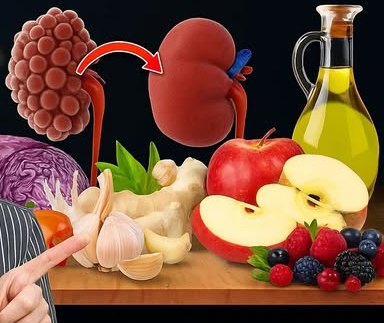Natural Strategies to Guard Your Kidneys and Avoid Chronic Illness
The kidneys are vital organs that carry out a variety of life-sustaining tasks in silence. However, renal illness can cause major consequences including cardiovascular issues and even kidney failure, and millions of individuals are unaware that they are at risk for it. The essential functions of the kidneys, typical causes of kidney impairment, and the top 12 foods that naturally promote kidney health and function will all be covered in this article.
Knowing How the Kidneys Work:
Your kidneys are more than just filters they are dynamic, intelligent organs that:
Filter waste and excess fluids from the blood
Balance electrolytes like potassium, sodium, and calcium
Regulate blood pressure
Produce essential hormones, including: Vitamin D (for bone health and immune function), Erythropoietin (EPO) (which stimulates red blood cell production)
When your kidneys aren’t working optimally, toxins build up, hormonal imbalances occur, and your overall health suffers — often without any early warning signs.
Top Foods for Healthy Kidneys:
These natural foods are not only delicious but also support kidney function, reduce inflammation, and help manage blood pressure and toxin levels.
Red Bell Peppers:
Low in potassium
Rich in vitamin C, B6, folate, and antioxidants
Help neutralize harmful free radicals
Cabbage:
High in fiber, folate, and vitamins C, B6, and K
Supports digestion and detoxification
Cauliflower & Broccoli:
Contain anti-inflammatory compounds
Rich in vitamin C and fiber
Promote liver and kidney health
Leafy Greens (e.g., spinach, kale):
High in vitamins C, K, and folate
Help reduce oxidative stress on the kidneys
Garlic:
Contains allicin, a powerful anti-inflammatory compound
Helps lower blood pressure and fight infections
Asparagus:
Natural diuretic, promotes urination
Contains fiber and phytonutrients that support kidney cleansing
Apples:
Rich in fiber (pectin) and antioxidants
Help reduce inflammation and detoxify the body
Berries (e.g., blueberries, cranberries, strawberries):
Low in sugar and potassium
High in antioxidants and phytonutrients
Help prevent kidney infections
Olive Oil, Nuts, Seeds, and Avocado:
Contain healthy fats and anti-inflammatory omega-3s
Support heart health, which is closely tied to kidney function
10. Melons (e.g., watermelon, cantaloupe)
High water content helps flush out toxins
Packed with vitamins A and C
Ginger:
Reduces inflammation and supports digestion
May help manage blood sugar and prevent kidney damage from diabetes
Turmeric:
Contains curcumin, a strong anti-inflammatory compound
Especially effective when paired with black pepper for absorption
Kidney Disease: A Silent Epidemic:
Over 40 million American adults have some stage of kidney disease, many without knowing it. Chronic kidney disease progresses silently and is often linked with:
Heart disease
High blood pressure
Diabetes
Fatigue, swelling, and frequent urination
Early detection and lifestyle changes can make a dramatic difference.
Leading Reasons for Kidney Damage:
The two leading causes of kidney damage are:
High blood pressure – It damages the small blood vessels (nephrons) in the kidneys, reducing their ability to filter waste.
Diabetes High blood sugar levels over time cause inflammation and scarring in the nephrons.
Other contributors include:
Smoking
Dehydration
Poor diet
Overuse of like ibuprofen
How to Reduce the Risk of Kidney Problems
You can protect your kidneys naturally by:
Drinking enough water daily
Exercising regularly
Avoiding smoking and alcohol
Reducing processed food intake
Monitoring blood pressure and blood sugar
Managing stress effectively
Avoiding excessive animal protein intake
Does a High Protein Diet Hurt the Kidneys?
A high-protein diet can overwork your kidneys. As protein is broken down, harmful urea and ketones are produced. While protein is essential, plant-based proteins are generally gentler on the kidneys and still provide ample nutrition.
Extra Advice to Maintain the Health of Your Kidneys:
Stay hydrated with clean, filtered water
Limit sodium and processed foods
Monitor urine colour dark yellow may indicate dehydration
Exercise regularly to promote blood circulation and toxin elimination
Avoid overuse of medications that strain the kidneys
Limiting or Avoiding Certain Foods:
To reduce stress on your kidneys:
Minimize high-sodium foods (canned soup, deli meats)
Avoid processed and fast foods
Cut back on refined sugar and sugary drinks
Limit red meat and dairy, which increase acid and waste load
Concluding Remarks: Naturally Support Your Kidneys:
Your kidneys keep your system healthy and purify your body around-the-clock. The good news is that you may lower your risk of chronic illness, safeguard your kidneys, and improve your general health by making wise dietary and lifestyle decisions.
Include these 12 kidney-friendly foods in your regular meals and make a commitment to healthy habits. Your kidneys will appreciate every clean food and drink, and prevention is always preferable than treatment.

